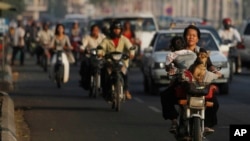Cambodian society has undergone some radical changes in recent years. Since the United Nations-led mission in the early 1990s, five national elections—with varying degrees of democratic credibility—have been held. A market-based economy has taken hold, and delivered a longterm average GDP growth rate of some 7 percent. The official figure for the number of Cambodians living in poverty fell dramatically from 47.8 percent in 2002 to just 18.9 percent a decade later.
Given all that has happened to the country and its population of 15 million, a group of scholars believes it is time to take a wider look at where Cambodian society has got to. The result is the forthcoming book, “The Handbook of Contemporary Cambodia,” which it is hoped will be completed this year and eventually be translated into the Khmer language.
It will give what the authors call “a comprehensive overview” of social, cultural, political and economic developments in Cambodia.
“We try to organize the structure of the book in such a way that people can follow a narrative of the twists and turns of what is going on in the contemporary Cambodian society,” said Simon Springer, one of the book’s co-editors.
The book brings together more than 35 scholars on Cambodia, including several Cambodian researchers. No one authors’ viewpoint dominates, said Springer, allowing “a diversity of voices to come through within the text.”
For that reason, the book shows “the readers that there really are some disagreements and some tensions in a way that these authors frame the contemporary situation—the political economy and socio-cultural implications,” Springer told VOA Khmer.
Springer, currently an associate professor at the geography department of the University of Victoria, British Columbia, has been researching Cambodia for the past 10 years. His recent work has focused on landlessness and the forced evictions that have taken place to make ways for urbanization in the country.
There are more than 35 chapters in the book which focus on different themes, including political economic tension, rural development, urban conflicts, social processes, and cultural currents.
The book is a rare large-scale research effort on Cambodia, where social research is still a nascent field.
One of the Cambodians involved in the project, Deth Sok Udom, a professor at Phnom Penh’s privately run Zaman University, is contributing a section on Cambodia’s role in regional and global geopolitics to the book.
He told VOA Khmer that as well as furthering knowledge of the country, research such as this one would provide useful and objective information for the government.
“The findings from social science are vital for policy development, so the government can find them useful,” he said.
Doing research is “an obligation” for professors, Deth Sok Udom added, bemoaning the fact that this is not supported under the country’s existing higher education system, which affords academics limited resources.








